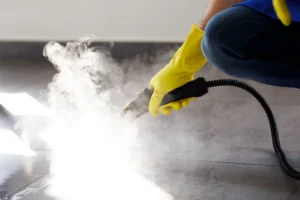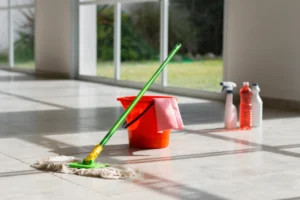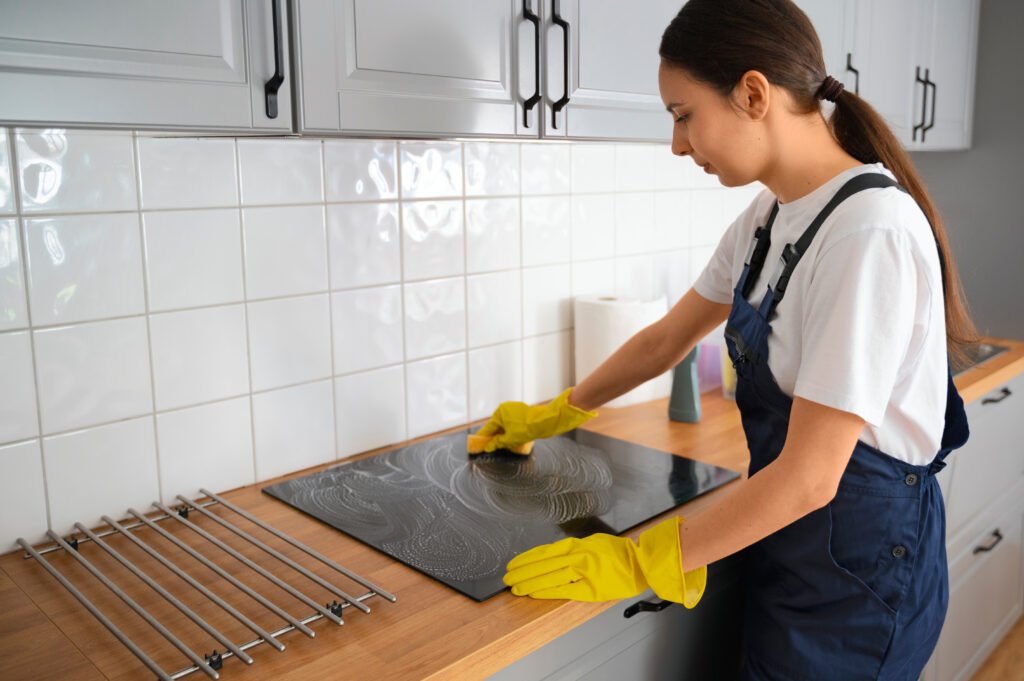
A kitchen cleaning service does far more than make the kitchen look pretty, it brings a sense of calm, order, and safety back into the heart of your home.
But over time, grease builds up near the stove, crumbs hide in corners, and the sink drain begins to smell faintly of last week’s leftovers. That’s exactly where a deep kitchen cleaning service comes in. It takes over what regular cleaning can’t.
What Really Happens During a Kitchen Deep Cleaning?
Many people believe that kitchen deep cleaning consists solely of sweeping the floor and wiping down counters. However, the process is considerably more when experts are hired to do a thorough cleaning of the kitchen.
Finding the places where dirt and bacteria like to hide in the kitchen, from the top shelves to the bottom of the sink, is the first step. Everything is then cleaned, layer by layer.
Here’s what’s usually covered:
- Cleaning kitchen cabinets inside and out, removing oil films, dust, and sticky residue.
- Wiping and disinfecting kitchen doors and handles that are touched hundreds of times.
- Scrubbing and washing the kitchen floor until stains and bacteria are gone.
- Kitchen sink drain cleaning and pipe flushing to remove buildup and prevent blockages.
- Degreasing stovetops, range hoods, and backsplash tiles.
- Sanitizing countertops with food-safe cleaners.
By the time the team finishes, even the air feels different, lighter, fresher, cleaner. That’s the power of true kitchen cleaning service work, it doesn’t just look clean, it feels clean.
Why Hygiene in the Kitchen Should Never Be Ignored
Everything is visible in the kitchen, including raw meat, veggies, leftovers, spills, and occasionally tiny crumbs that remain for days. Additionally, the air creates a perfect habitat for bacteria due to its warmth and moisture content.
Bacteria can therefore move more quickly than anticipated from one surface to another. Food safety is at risk with just one contaminated location. Because of this, maintaining good hygiene is crucial and not optional.
The goal of a kitchen cleaning service is to clean with intention. Using food-grade chemicals, every surface, utensil, and drain is meticulously cleaned. This ensures that there are no bacteria hidden beneath the surface when food comes into contact with the counter again.
Maintaining a clean kitchen not only improves the aesthetics of the area but also safeguards the health of all household members.
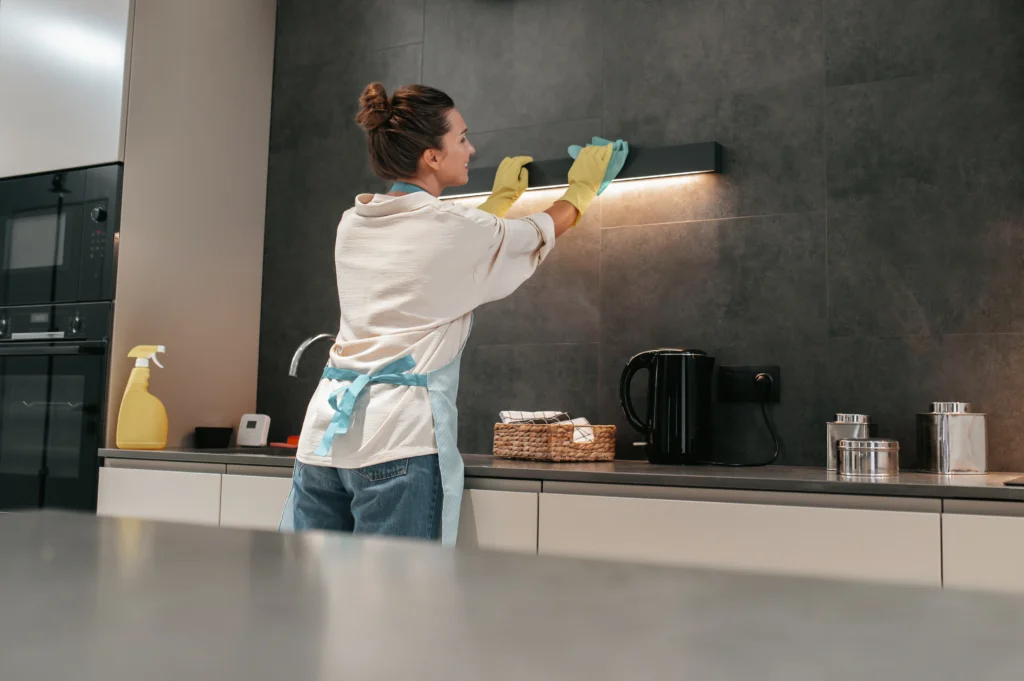
Kitchen Cleaning Tips to Keep Your Space Fresh Every Day
Of course, professional deep cleaning can’t happen daily. That’s why keeping small habits in place makes all the difference between one kitchen cleaning service and the next.
Here are some simple kitchen cleaning tips that truly work when practiced daily:
- Wipe down counters right after cooking, especially near the stove area.
- Empty trash cans before they start to smell.
- Wash the kitchen floor every evening to avoid sticky spots.
- Keep the sink dry when not in use, moisture invites bacteria.
- Follow a kitchen cleaning checklist so nothing gets overlooked.
These little actions might seem small, but together they keep the kitchen looking and smelling fresh all week long.
How to Clean Kitchen Sink Blockage and Drain Pipes
The sink is where most kitchen problems begin. Over time, food particles, oil, and soap scum combine to form stubborn clogs. One day the water starts draining slower, and before long, the sink is backed up.
Instead of reaching for harsh chemicals right away, try this simple approach for how to clean kitchen sink blockage naturally:
- Start by pouring boiling water down the drain to melt grease buildup.
- Add half a cup of baking soda, followed by vinegar, let it fizz for 15 minutes.
- Rinse again with hot water to clear it all out.
For tougher clogs, use the best drain cleaner for kitchen sink products that’s pipe-safe and non-toxic. Professionals handle kitchen sink drain cleaning using eco-friendly solutions and pressure tools that remove even years of buildup without damaging the pipes.
Smart DIY Cleaning Hacks That Save Time
Not every mess requires a service call. Some diy cleaning hacks are simple, quick, and incredibly effective for regular maintenance.
- Lemon and salt can clean stainless steel sinks while leaving a natural shine.
- Vinegar and baking soda easily cut through greasy spots on the stove.
- Olive oil can be used to polish wooden surfaces or stainless appliances.
- Old toothbrushes are perfect for cleaning between tiles and hard-to-reach areas.
These cleaning hacks take only a few minutes but make your next professional kitchen cleaning service even more effective, because there’s less buildup to tackle.
Cleaning Kitchen Cabinets and Wood Surfaces the Right Way
Cabinets are often forgotten during regular cleaning. But over time, the heat and steam from cooking cause oils to stick to wood surfaces, making them dull and grimy.
Here’s how to clean wood cabinets without damaging the finish:
- Mix warm water with a drop or two of dish soap.
- Wipe gently using a soft cloth, avoid scrubbing.
- Dry the surface immediately to prevent swelling or water marks.
- Apply a light wood polish to bring back shine and protection.
When cleaning kitchen cabinets, never forget the handles, they’re one of the most frequently touched parts of the kitchen. A gentle disinfectant wipe keeps them germ-free.
A Kitchen Cleaning Checklist to Keep You Organized
Having a kitchen cleaning checklist helps take the mental load off. You don’t have to remember everything – just follow the list and check things off.
| Cleaning Task | Frequency | Notes |
| Wipe counters & sink | Daily | Use mild soap and water |
| Wash kitchen floor | Daily | Keeps bacteria away |
| Clean stove & backsplash | Weekly | Degrease properly |
| Empty & clean fridge | Weekly | Avoid food odor |
| Cleaning kitchen cabinets & doors | Monthly | Focus on handles and corners |
| Schedule kitchen cleaning service | Quarterly | Deep clean for hygiene |
A checklist like this ensures every spot gets attention and your kitchen stays consistently clean.
Why a Professional Kitchen Cleaning Service Is Worth It
Here’s the truth, no matter how much time someone spends cleaning, professionals always reach a level that’s hard to match. A kitchen cleaning service doesn’t just clean; it restores.
They use specialized steamers, eco-safe disinfectants, and heavy-duty tools to target places that aren’t easy to access behind the fridge, under the stove, inside vents, and deep within drains.
The results speak for themselves:
- Hidden grease and grime are gone.
- Bacteria and mold are fully eliminated.
- Air smells fresher because the source of odor is removed.
After one deep kitchen cleaning service, you’ll notice cooking feels different, lighter, cleaner, more enjoyable.
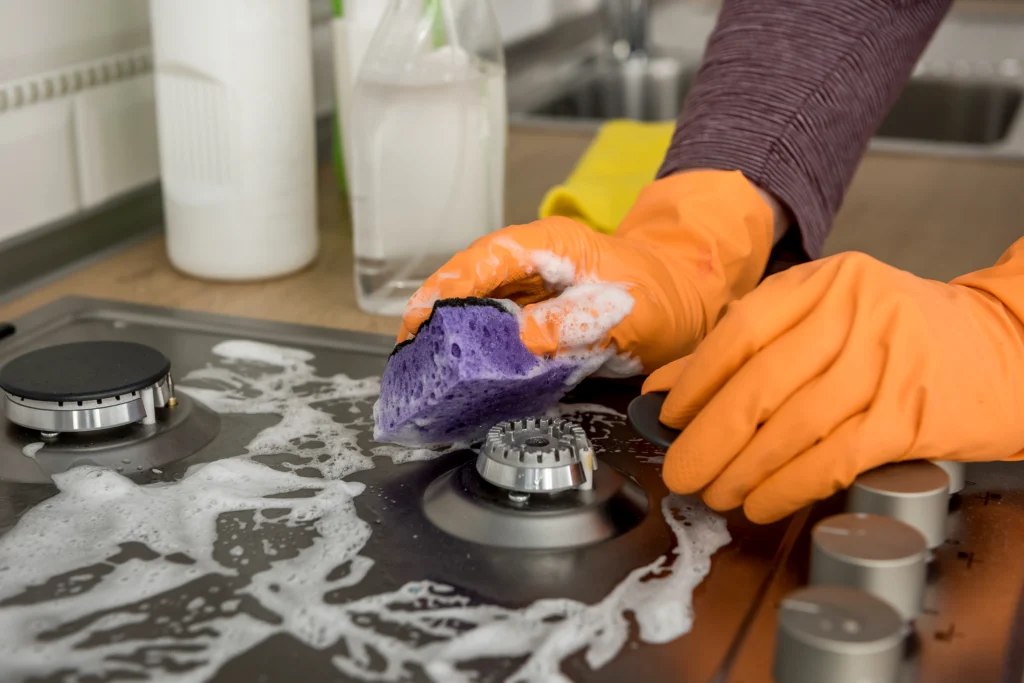
Keeping the Kitchen Clean Between Deep Services
Once the kitchen is spotless, keeping it that way doesn’t have to be hard. A few positive habits make a big difference:
- In storage, keep cooked and raw food apart.
- Clean up spills as soon as they occur.
- Rinse clothes and sponges every day to avoid bacteria.
- Examine the area beneath the sink for any signs of dampness, since mold thrives there.
Your next kitchen cleaning service won’t just be a fix; it will be a simple
Conclusion:
There’s something special about walking into a clean kitchen. The counters shine, the air feels lighter, and the space just invites you in. That’s what a kitchen cleaning service gives back – not just cleanliness, but comfort.
Peace of mind comes from thorough cleaning. By eliminating hidden elements like germs, grease, and old buildup, it restores the freshness that makes a kitchen the center of a house. Cooking no longer feels like labor when everything is in its proper place and every surface is shining.
Frequently Asked Questions
How often should a kitchen deep cleaning be done?
Every 3–4 months works well for most homes, depending on how often you cook.
Can natural ingredients clean effectively?
Yes, lemon, vinegar, and baking soda are top diy cleaning hacks that actually work.
What’s the easiest way to handle kitchen sink blockages?
Use baking soda and vinegar, followed by hot water, it’s effective and safe.
How do professionals clean drains safely?
They use eco-friendly kitchen sink drain cleaning methods and pressure tools to clear deep buildup.
Should the kitchen floor be washed daily?
Absolutely. Regular cleaning prevents grime and keeps the area hygienic.
How to clean the sink quickly each day?
Use dish soap, scrub lightly, rinse with warm water, and dry with a towel.
Does a kitchen cleaning service handle old grease stains?
Yes, professional degreasers and steam cleaning can remove long-set stains.
What belongs in a kitchen cleaning checklist?
Counters, floors, cabinets, doors, and drains, they’re the main hygiene zones.
Why clean kitchen doors regularly?
Handles collect germs, especially after cooking or handling raw food.
What makes professional kitchen cleaners different?
They use stronger, food-safe formulas that clean deeply without harming surfaces.





